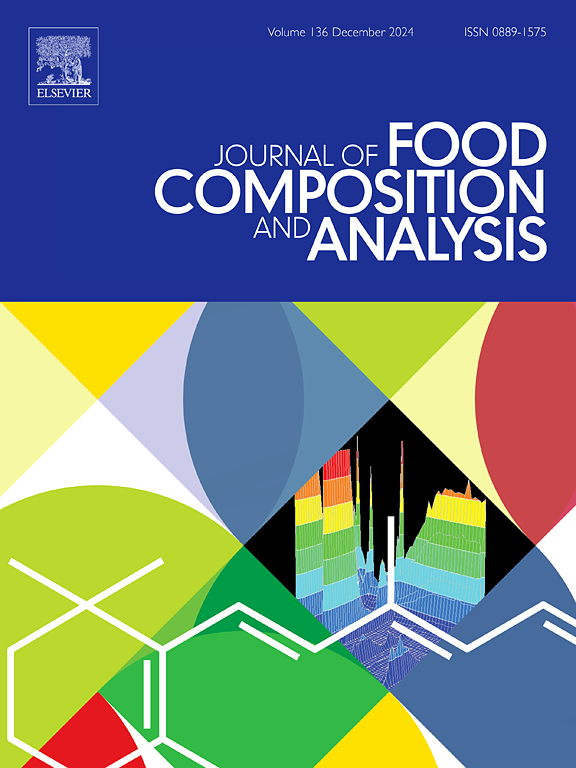The high share of steryl esters is responsible for the unusual sterol pattern of black goji berries
IF 4
2区 农林科学
Q2 CHEMISTRY, APPLIED
引用次数: 0
Abstract
Phytosterols are bioactive and healthy components of the human diet. Although numerous investigations reported the rich nutrients in black goji berries, comprehensive data on the sterol pattern were missing. In this study, gas chromatography with mass spectrometry (GC/MS) analysis enabled the detection of 23 sterols and 22 fatty acids in dried black goji berry samples. Black goji berries were dominated by ∆5-avenasterol (mean: 23.7 %) > the rare campesta-5,24(25)-dienol (mean: 19.2 %) > β-sitosterol (mean: 14.9 %). Investigations of the reasons for this unique sterol pattern showed that ∼76% of the sterols in black goji berries were esterified with fatty acids (steryl esters). This share of steryl esters was higher than in virtually all other plant samples where free sterols are predominant. Remarkably, the rare campesta-5,24(25)-dienol was most prominent in the steryl ester fraction. Manual separation and analyses of seeds and pulp subsamples showed that most of the sterols were found in seeds where steryl esters were predominant (∼71 %), while the pulp was dominated by free sterols (∼73 %). Hence, the unconventional sterol pattern of black goji berries mainly originated from the high share of steryl esters in the seeds in combination with different sterol patterns in free and esterified sterols.
甾醇酯的高比例是黑枸杞不同寻常的甾醇模式的原因
植物甾醇是人类饮食中具有生物活性的健康成分。尽管许多研究报告了黑枸杞中丰富的营养成分,但却缺乏有关甾醇模式的全面数据。本研究通过气相色谱-质谱(GC/MS)分析法检测了黑枸杞干果样品中的 23 种甾醇和 22 种脂肪酸。黑枸杞主要含有∆5-芒柄甾醇(平均含量:23.7%)>;罕见的莰烯-5,24(25)-二烯醇(平均含量:19.2%)>;β-谷甾醇(平均含量:14.9%)。对这种独特固醇模式的原因进行的调查显示,黑枸杞中 76% 的固醇与脂肪酸(固醇酯)酯化。甾醇酯所占的比例高于几乎所有其他以游离甾醇为主的植物样本。值得注意的是,罕见的 Campesta-5,24(25)-二烯醇在甾醇酯部分中最为突出。对种子和果肉子样的人工分离和分析表明,大部分固醇存在于种子中,其中固醇酯占主导地位(∼71 %),而果肉则以游离固醇为主(∼73 %)。因此,黑枸杞非常规的甾醇模式主要源于种子中高比例的甾基酯以及游离和酯化甾醇中不同的甾醇模式。
本文章由计算机程序翻译,如有差异,请以英文原文为准。
求助全文
约1分钟内获得全文
求助全文
来源期刊

Journal of Food Composition and Analysis
工程技术-食品科技
CiteScore
6.20
自引率
11.60%
发文量
601
审稿时长
53 days
期刊介绍:
The Journal of Food Composition and Analysis publishes manuscripts on scientific aspects of data on the chemical composition of human foods, with particular emphasis on actual data on composition of foods; analytical methods; studies on the manipulation, storage, distribution and use of food composition data; and studies on the statistics, use and distribution of such data and data systems. The Journal''s basis is nutrient composition, with increasing emphasis on bioactive non-nutrient and anti-nutrient components. Papers must provide sufficient description of the food samples, analytical methods, quality control procedures and statistical treatments of the data to permit the end users of the food composition data to evaluate the appropriateness of such data in their projects.
The Journal does not publish papers on: microbiological compounds; sensory quality; aromatics/volatiles in food and wine; essential oils; organoleptic characteristics of food; physical properties; or clinical papers and pharmacology-related papers.
 求助内容:
求助内容: 应助结果提醒方式:
应助结果提醒方式:


